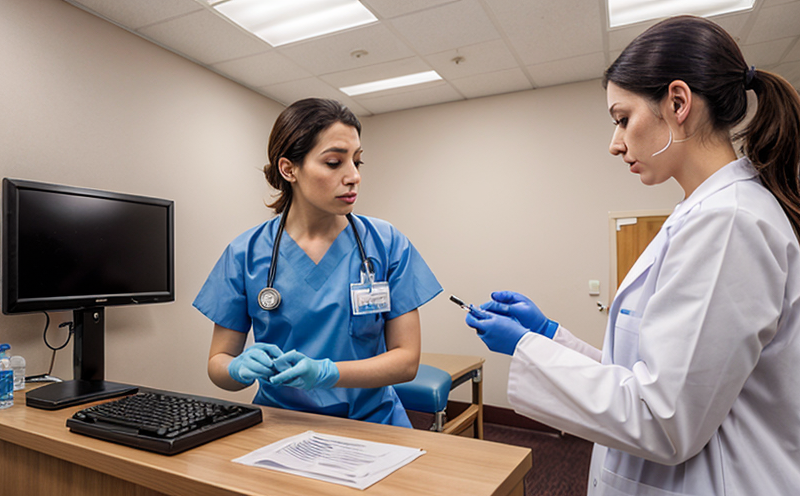Cyanogenic Glycoside Screening in Cassava Products
In the realm of Clinical & Healthcare Testing, ensuring food safety is paramount. This service specifically targets Cyanogenic Glycoside Screening in Cassava Products. Cassava, a staple crop in many parts of the world, contains cyanogenic glycosides which can be converted into hydrogen cyanide under certain conditions. The presence of these compounds poses significant health risks if consumed in high quantities.
The need for accurate and reliable screening methods has never been more critical given the increasing demand for cassava-based products in global markets. This service ensures that food safety standards are met, thereby protecting consumers from potential health hazards associated with cyanogenic glycosides.
Cyanide poisoning can lead to severe health issues including convulsions, respiratory failure, and even death if not treated promptly. By providing precise cyanogenic glycoside screening services, we contribute significantly towards maintaining public health by ensuring cassava products are safe for consumption.
This service aligns closely with international standards such as ISO 20394:2012, which provides guidelines on the determination of cyanide in foodstuffs. Our approach ensures compliance not only with these global norms but also local regulations specific to various countries.
Our team comprises highly skilled professionals equipped with state-of-the-art equipment designed specifically for this type of analysis. Using advanced techniques like high-performance liquid chromatography (HPLC), gas chromatography-mass spectrometry (GC-MS) among others, we deliver accurate results that meet both internal and external quality assurance requirements.
By choosing our cyanogenic glycoside screening service, you can rest assured knowing your products comply with stringent safety standards. Our commitment to excellence extends beyond mere compliance; it encompasses proactive measures aimed at preventing any potential risks associated with these compounds in cassava-based goods.
Scope and Methodology
The following table outlines the scope and methodology used for cyanogenic glycoside screening:
| Sampling Procedure | Sample Preparation | Analytical Techniques | Result Interpretation |
|---|---|---|---|
| Clean and representative samples are collected from production batches. | Samples undergo extraction using appropriate solvents followed by filtration and concentration steps. | Instrumental methods including HPLC and GC-MS are employed for quantification. | Results interpreted based on comparison against established reference values. |
The sampling procedure involves collecting clean and representative samples from production batches. These samples then undergo preparation through extraction using appropriate solvents, followed by filtration and concentration steps. For analysis, instrumental methods such as HPLC (High-Performance Liquid Chromatography) and GC-MS (Gas Chromatography-Mass Spectrometry) are utilized.
The results obtained from these analyses are interpreted based on comparisons against established reference values provided in relevant international standards like ISO 20394:2012. This ensures that all findings align with recognized benchmarks for safety and quality assurance purposes.
International Acceptance and Recognition
This service has gained widespread recognition across numerous countries due to its adherence to stringent international standards. Many nations have implemented regulations requiring mandatory testing of cyanogenic glycosides in cassava products before they can be sold commercially.
For instance, the European Union (EU) mandates that all imported food items must adhere strictly to EU directives on food safety and quality assurance. Similarly, several African countries like Nigeria have established regulatory frameworks governing the production, processing, and distribution of cassava-based goods.
In addition to national laws, international organizations such as the World Health Organization (WHO) also recommend rigorous testing protocols for cyanogenic glycosides in various crops including cassava. Compliance with these standards not only enhances product safety but also fosters trust among consumers and stakeholders worldwide.
Our laboratory adheres strictly to all relevant guidelines set forth by these bodies, ensuring that our clients receive accurate results that comply with both local laws and international norms. By doing so, we help maintain high standards of food safety and quality in the global market.
Use Cases and Application Examples
The application of this service extends far beyond mere compliance; it plays a crucial role in safeguarding public health. Here are some real-world scenarios where our cyanogenic glycoside screening services prove invaluable:
- R&D Projects: During the development phases of new cassava-based products, rigorous testing helps identify potential risks early on.
- Quality Assurance: Regular screenings ensure that production processes remain consistent and meet established safety standards.
- Regulatory Compliance: Ensuring compliance with local and international regulations regarding food safety and quality.
- Consumer Trust: Reassures consumers about the safety of the products they consume, thereby enhancing brand reputation.
In conclusion, by leveraging our expertise in cyanogenic glycoside screening, businesses can protect themselves against legal liabilities while simultaneously promoting consumer confidence. This service is essential for maintaining high standards of food safety and quality across all stages of cassava product development and distribution.





